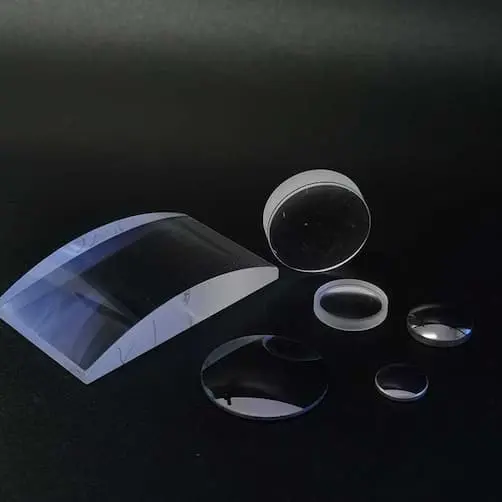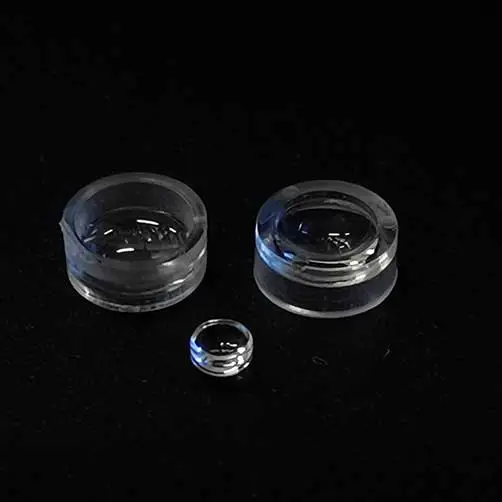Borosilicate is the alternative for borofloat 33 (BF33). Therefore, this kind of glass is called high borosilicate glass.
Our Borosilicate window has high transmittance in the visible and near-infrared regions, making it ideal for a wide range of optical applications. It boasts a unique combination of excellent optical clarity and durability, allowing it to perform well in harsh environments.
Borosilicate glass windows are widely used in a variety of applications due to their high thermal and chemical resistance, as well as their excellent optical properties. They are commonly used in scientific and industrial settings for applications such as microscopy, spectroscopy, and chemical processing.
Material | Borosilicate |
Diameter | 1 to 500 mm |
Diameter Tolerance | +0/-0.02 mm |
Thickness Tolerance | ±0.01 mm |
Surface Quality | 10-5 |
Surface Figure | λ/10 |
Parallelism | 1 Minute |
Coating | Uncoated, AR, HR, Beamsplitter, etc. |
Our product is designed with exceptional heat resistance and thermal shock resistance, making it ideal for high-temperature environments. With its excellent resistance to chemical damage, you can rest assured that our Borosilicate window is built to last.
With TC Optik's Borosilicate window, you can expect superior performance and reliability - all at a competitive price point. Whether you're involved in research, development or industrial applications, our Borosilicate window is the perfect solution for your optical needs.
Types of optical window glass for your needs:
Fused quartz glass
Borosilicate glass' high-temperature resistance is very great and it can make a popular material for laboratory equipment. Its low temperature tolerance makes it an ideal choice for many different uses. Borosilicate glass has several unique properties, including low thermal expansion. Its high heat resistance enables scientists to study tiny organisms. It is a popular telescope material because it can withstand extremely high temperatures and a range of temperature variations. It is best suited for applications that require an extremely high level of security.
Borosilicate glass windows have excellent optical properties, with a high level of transparency in both the visible and near-infrared (NIR) regions. They have a refractive index of around 1.5, making them an ideal material for use in optical systems that require minimal refraction or reflection.
Borosilicate glass windows are known for their high thermal and chemical resistance. They have a low coefficient of thermal expansion, which means that they can withstand rapid temperature changes without cracking or breaking. They are also resistant to chemical corrosion, making them ideal for use in harsh chemical environments.
What is borosilicate glass used for? Borosilicate glass is very strong and cheap. So it is widely used in different areas. Borosilicate has a low temperature, so it is a good choice for different applications. Because borosilicate glass has high-temperature resistance, it is best for telescope material. Its durability makes it a perfect material for lab equipment. It can be molded into tubes and drawn into custom shapes. borosilicate glass is also very good for scientific instruments, such as microscopes, and testing machines. borosilicate glass is durable enough to withstand high heat and corrosive materials. It is dishwasher-safe and microwave safe
Borosilicate glass windows are commonly used in microscopy applications, where their high transparency and low refractive index make them ideal for use in optical systems. They are often used in fluorescence microscopy, where their low autofluorescence helps to reduce background noise.
Borosilicate glass windows are also used in spectroscopy applications, where their high transparency and low refractive index make them ideal for use as beamsplitters or windows for sample chambers. They are often used in Fourier transform infrared (FTIR) spectrometers, where they are used as beamsplitters or windows for sample chambers.
Borosilicate glass windows are used in chemical processing applications due to their high resistance to chemical corrosion. They are often used as sight glasses in chemical reactors or as windows for chemical processing equipment.
What is borosilicate glass made of?
A: Borosilicate glass is made of silica and boron trioxide.
What is the coefficient of thermal expansion of borosilicate glass?
A: The coefficient of thermal expansion of borosilicate glass is very low, which means that it can withstand rapid temperature changes without cracking or breaking.
Can borosilicate glass be used in harsh chemical environments?
A: Yes, borosilicate glass is highly resistant to chemical corrosion, making it ideal for use in harsh chemical environments.
What is the refractive index of borosilicate glass?
A: The refractive index of borosilicate glass is around 1.5.
What is the typical thickness of boro silicate glass windows?
A: Borosilicate glass windows are available in thicknesses ranging from a few millimeters to several centimeters, depending on the application.
If you would like to build your own precision optical products or request a quote, please click one of the two buttons below. Otherwise, please fill out the form below with any questions or concerns.

Address
No. 946,Chaoyue street,High-tech zone,Changchun city,Jilin
Call Us
+86-431-84563660


